Items filtered by date: August 2023
Causes and Symptoms of Tarsal Tunnel Syndrome
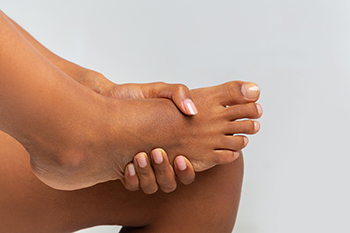
Tarsal tunnel syndrome, abbreviated as TTS, is a nerve disorder that can cause discomfort and pain in the foot. Similar to carpal tunnel syndrome in the wrist, TTS involves compression of the tibial nerve in the tarsal tunnel, which is a narrow passage on the inside of the ankle. This compression can result from various factors, including injury, overuse, or having flat feet. Additionally, patients who have diabetes may be susceptible to developing tarsal tunnel syndrome. Individuals who have TTS often report sensations of tingling, burning, or numbness along the inner ankle, which can radiate into the sole of the foot or the toes. Pain may worsen during periods of prolonged standing or activity. Addressing tarsal tunnel syndrome involves getting adequate rest, wearing supportive footwear, and in severe cases, surgery may be necessary. If you suspect you may have tarsal tunnel syndrome, it is suggested that you consult a podiatrist who can provide you with an accurate diagnosis and a tailored treatment plan.
Tarsal tunnel syndrome can be very uncomfortable to live with. If you are experiencing tarsal tunnel syndrome, contact one of our podiatrists of Toms River Podiatrist . Our doctors can provide the care you need to keep you pain-free and on your feet.
Tarsal Tunnel Syndrome
Tarsal tunnel syndrome, which can also be called tibial nerve dysfunction, is an uncommon condition of misfiring peripheral nerves in the foot. The tibial nerve is the peripheral nerve in the leg responsible for sensation and movement of the foot and calf muscles. In tarsal tunnel syndrome, the tibial nerve is damaged, causing problems with movement and feeling in the foot of the affected leg.
Common Cause of Tarsal Tunnel Syndrome
- Involves pressure or an injury, direct pressure on the tibial nerve for an extended period of time, sometimes caused by other body structures close by or near the knee.
- Diseases that damage nerves, including diabetes, may cause tarsal tunnel syndrome.
- At times, tarsal tunnel syndrome can appear without an obvious cause in some cases.
The Effects of Tarsal Tunnel Syndrome
- Different sensations, an afflicted person may experience pain, tingling, burning or other unusual sensations in the foot of the affected leg.
- The foot muscles, toes and ankle become weaker, and curling your toes or flexing your foot can become difficult.
- If condition worsens, infections and ulcers may develop on the foot that is experiencing the syndrome.
A physical exam of the leg can help identify the presence of tarsal tunnel syndrome. Medical tests, such as a nerve biopsy, are also used to diagnose the condition. Patients may receive physical therapy and prescriptive medication. In extreme cases, some may require surgery.
If you have any questions please feel free to contact our office located in Toms River, NJ . We offer the newest diagnostic and treatment technologies for all your foot and ankle needs.
Avoiding Foot Pain
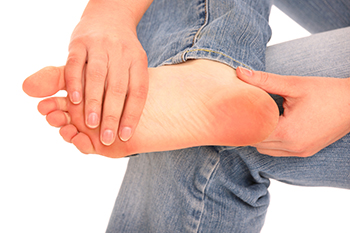
To prevent foot pain and related issues, managing excessive weight can reduce stress on the feet and lower the risk of joint pain. Prioritize wearing supportive footwear over style, and avoid non-supportive flip flops and uncomfortable high heels known for causing toe deformities, bunions, and ankle injuries. Choose shoes that fit well and have adequate arch support and non-slip soles. Engage in calf stretches and avoid overexertion in high impact activities such as running that can help to prevent plantar fasciitis. Balance can be Improved by alternating standing and sitting. Maintain toenail care to prevent ingrown nails, keeping them at a moderate length and wearing roomy shoes. If you have foot pain, wounds, or infections, especially if you are diabetic, it is strongly suggested that you make an appointment with a podiatrist for care.
Foot Pain
Foot pain can be extremely painful and debilitating. If you have a foot pain, consult with one of our podiatrists from Toms River Podiatrist . Our doctors will assess your condition and provide you with quality foot and ankle treatment.
Causes
Foot pain is a very broad condition that could be caused by one or more ailments. The most common include:
- Bunions
- Hammertoes
- Plantar Fasciitis
- Bone Spurs
- Corns
- Tarsal Tunnel Syndrome
- Ingrown Toenails
- Arthritis (such as Gout, Rheumatoid, and Osteoarthritis)
- Flat Feet
- Injury (from stress fractures, broken toe, foot, ankle, Achilles tendon ruptures, and sprains)
- And more
Diagnosis
To figure out the cause of foot pain, podiatrists utilize several different methods. This can range from simple visual inspections and sensation tests to X-rays and MRI scans. Prior medical history, family medical history, and any recent physical traumatic events will all be taken into consideration for a proper diagnosis.
Treatment
Treatment depends upon the cause of the foot pain. Whether it is resting, staying off the foot, or having surgery; podiatrists have a number of treatment options available for foot pain.
If you have any questions, please feel free to contact our office located in Toms River, NJ . We offer the newest diagnostic and treatment technologies for all your foot care needs.
Heel Pain Causes
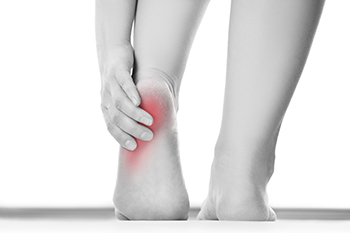
Heel pain is a common ailment that can significantly impact daily activities and quality of life. Several factors contribute to heel pain, with the most prevalent cause being plantar fasciitis, an inflammation of the thick band of tissue running across the bottom of the foot. Other culprits include Achilles tendinitis, heel spurs, and bursitis. Lifestyle factors such as excessive weight, improper footwear, and repetitive overuse during physical activities can exacerbate the condition. Effective treatments for heel pain focus on reducing inflammation, managing pain, and promoting healing. Adequate rest and taking over-the-counter pain relievers may offer temporary relief. Stretching exercises and wearing orthotic inserts can provide significant relief. Early intervention and a comprehensive approach to treatment can help individuals regain their mobility and alleviate the discomfort associated with heel pain. If you have heel pain, it is strongly suggested that you consult a podiatrist who can properly diagnose the cause and offer effective treatment methods.
Many people suffer from bouts of heel pain. For more information, contact one of our podiatrists of Toms River Podiatrist . Our doctors can provide the care you need to keep you pain-free and on your feet.
Causes of Heel Pain
Heel pain is often associated with plantar fasciitis. The plantar fascia is a band of tissues that extends along the bottom of the foot. A rip or tear in this ligament can cause inflammation of the tissue.
Achilles tendonitis is another cause of heel pain. Inflammation of the Achilles tendon will cause pain from fractures and muscle tearing. Lack of flexibility is also another symptom.
Heel spurs are another cause of pain. When the tissues of the plantar fascia undergo a great deal of stress, it can lead to ligament separation from the heel bone, causing heel spurs.
Why Might Heel Pain Occur?
- Wearing ill-fitting shoes
- Wearing non-supportive shoes
- Weight change
- Excessive running
Treatments
Heel pain should be treated as soon as possible for immediate results. Keeping your feet in a stress-free environment will help. If you suffer from Achilles tendonitis or plantar fasciitis, applying ice will reduce the swelling. Stretching before an exercise like running will help the muscles. Using all these tips will help make heel pain a condition of the past.
If you have any questions please contact our office located in Toms River, NJ . We offer the newest diagnostic and treatment technologies for all your foot and ankle needs.
See Your Podiatrist Regularly If You Work On Your Feet
Essential Tips for Diabetic Foot Care
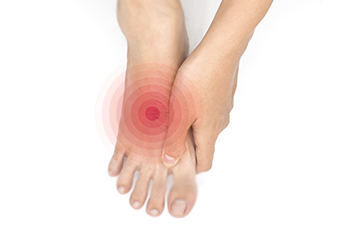
For individuals with diabetes, a proper foot care routine is crucial to managing their health. High blood sugar levels can damage nerves and reduce blood flow to the feet, increasing the risk of complications. A diabetic foot care routine can begin with washing your feet daily with mild soap and warm water and ensuring thorough drying, especially between the toes, to prevent infections. This can be followed by examining the feet every day for any cuts, blisters, redness, or swelling. Early detection of problems is essential for timely intervention. It is vital to keep the skin hydrated by applying moisturizer. Wearing proper shoes can help the feet to feel comfortable, and it is beneficial to refrain from walking barefoot. Trim the nails straight across instead of in a curved fashion to prevent ingrown toenails. If you have diabetes, it is strongly suggested that you are under the care of a podiatrist trained to deal with complications from this diabetes.
Diabetic foot care is important in preventing foot ailments such as ulcers. If you are suffering from diabetes or have any other concerns about your feet, contact one of our podiatrists from Toms River Podiatrist . Our doctors can provide the care you need to keep you pain-free and on your feet.
Diabetic Foot Care
Diabetes affects millions of people every year. The condition can damage blood vessels in many parts of the body, especially the feet. Because of this, taking care of your feet is essential if you have diabetes, and having a podiatrist help monitor your foot health is highly recommended.
The Importance of Caring for Your Feet
- Routinely inspect your feet for bruises or sores.
- Wear socks that fit your feet comfortably.
- Wear comfortable shoes that provide adequate support.
Patients with diabetes should have their doctor monitor their blood levels, as blood sugar levels play such a huge role in diabetic care. Monitoring these levels on a regular basis is highly advised.
It is always best to inform your healthcare professional of any concerns you may have regarding your feet, especially for diabetic patients. Early treatment and routine foot examinations are keys to maintaining proper health, especially because severe complications can arise if proper treatment is not applied.
If you have any questions please feel free to contact our office located in Toms River, NJ . We offer the newest diagnostic and treatment technologies for all your foot and ankle needs.
Reasons for Cracked Heels
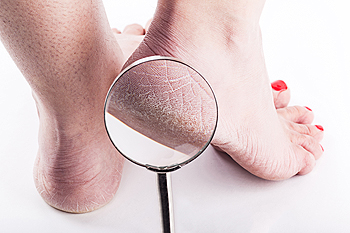
Mildly cracked heels are generally not a serious foot condition unless they develop into fissures, which may bleed and become infected. Cracked heels are caused by standing on hard or uneven surfaces for most of the day, or from wearing shoes that do not have a back. Flip-flops fall into this category, and it is beneficial to limit wearing these types of shoes. Patients who have existing medical conditions, such as psoriasis, diabetes, or a thyroid disorder, may be prone to getting cracked heels. One of the first signs that cracked heels may be developing is the hard, thickened skin surrounding the heel. This is referred to as a callus and can be yellow or brown in color. Cracks can form over the callus and can become worse when pressure of standing or running is exerted. Effective prevention methods can include washing and drying the feet daily, followed by applying a good moisturizer on them. If you have cracked heels that are causing problems, it is suggested that you speak with a podiatrist who can successfully treat this condition.
If the skin on your feet starts to crack, you may want to see a podiatrist to find treatment. If you have any concerns, contact one of our podiatrists from Toms River Podiatrist . Our doctors can provide the care you need to keep you pain-free and on your feet.
Cracked Heels
It is important to moisturize your cracked heels in order to prevent pain, bleeding, and infection. The reason cracked heels form is because the skin on the foot is too dry to support the immense pressure placed on them. When the foot expands, the dry skin on the foot begins to split.
Ways to Help Heal Them
- Invest in a good foot cream
- Try Using Petroleum Jelly
- Ease up on Soaps
- Drink Plenty of Water
Ways to Prevent Cracked Heels
- Moisturize After Showering
- Skip a Shower
- Keep Shower Water Lukewarm
- Don’t Scrub Your Feet
If you are unsure how to proceed in treating cracked heels, seek guidance from a podiatrist. Your doctor will help you with any questions or information you may need.
If you have any questions, please feel free to contact our office located in Toms River, NJ . We offer the newest diagnostic and treatment technologies for all your foot care needs.

